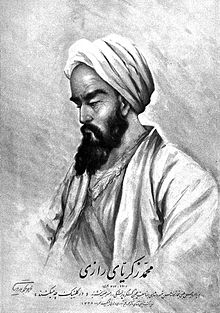Muhammad ibn Zakarīya Rāzi
| Abūbakr-e Mohammad-e Zakariyyā-ye Rāzī ابوبكر محمّد زکرياى رازى |
|
|---|---|
 |
|
| Born | 854 CE Rey (near Tehran), Iran |
| Died | 932 or 925 CE Rey, Iran |
| Era | Islamic golden age |
|
Main interests
|
Chemistry, medicine, philosophy |
|
Notable ideas
|
The first to produce acids such as sulfuric acid, writing up limited or extensive notes on diseases such as smallpox and chickenpox, a pioneer in ophthalmology, author of the first book on pediatrics, making leading contributions in inorganic and organic chemistry, also the author of several philosophical works. |
Abū Bakr Muhammad ibn Zakariyyā al-Rāzī (ابوبكر محمّد زکرياى رازى Abūbakr-e Mohammad-e Zakariyyā-ye Rāzī, also known by his Latinized name Rhazes or Rasis) (854 CE – 925 CE), was a Persianpolymath, physician, alchemist, philosopher, and important figure in the history of medicine.
A comprehensive thinker, Razi made fundamental and enduring contributions to various fields, which he recorded in over 200 manuscripts, and is particularly remembered for numerous advances in medicine through his observations and discoveries. An early proponent of experimental medicine, he became a successful doctor, and served as chief physician of Baghdad and Rey hospitals. As a teacher of medicine, he attracted students of all backgrounds and interests and was said to be compassionate and devoted to the service of his patients, whether rich or poor.
According to the Encyclopaedia Britannica (1911) he was among the first to use humoral theory to distinguish one contagious disease from another, and wrote a pioneering book about smallpox and measles providing clinical characterization of the diseases. He also discovered numerous compounds and chemicals including alcohol and kerosene, among others.
...
Wikipedia
